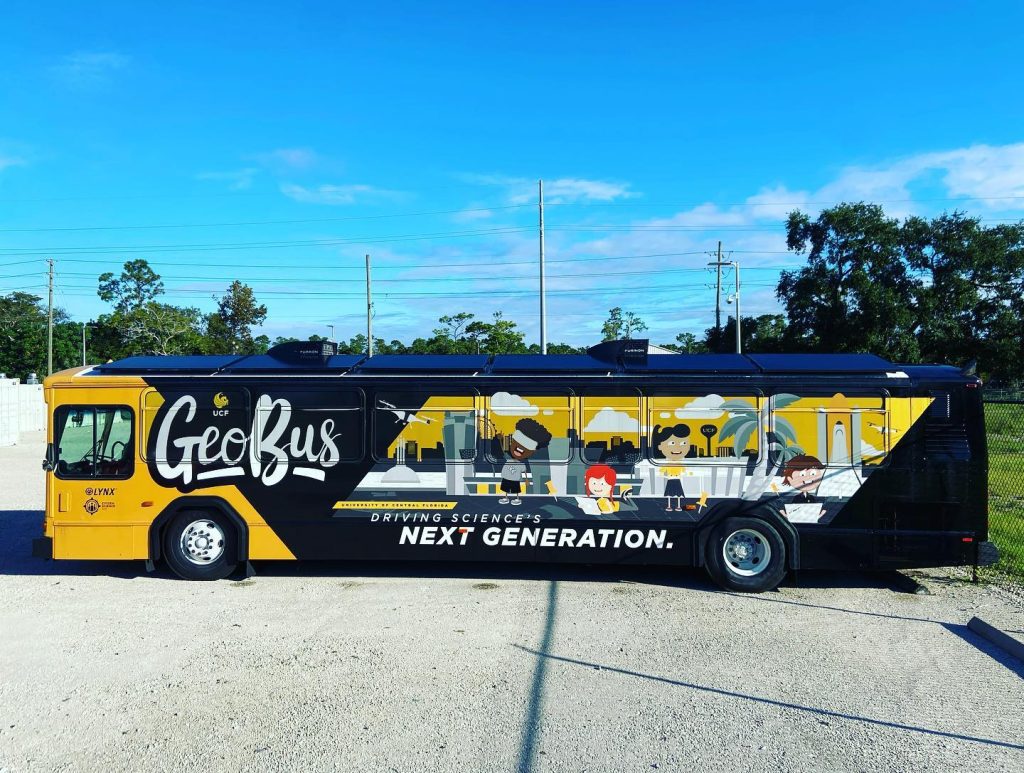School District Partnership Deepens GeoBus Reach, Impact

The impact of the nation’s first GeoBus continues to grow, with a new partnership bringing the immersive educational experience to 18 Title I Brevard County schools this spring semester, with an additional set of schools to continue in the next school year.
The partnership ushers in the next phase for GeoBus from one-off school visits to a more formal relationship that opens fresh opportunities for elementary students to discover the value of geospatial technology for science and social studies. The partnership was launched in January through an “organic relationship” as Associate Professor of Geographic Information Systems Timothy Hawthorne, Ph.D., puts it.
“A couple of Brevard high school teachers who had previously worked with our team had a great experience and connected us with school leadership,” he said.
Gina Tagye, principal of Cambridge Elementary School, agrees, saying: “Thank you for the opportunity for our students to participate. They loved it!”
During school events, students are invited to test out the nine learning activities located in and around GeoBus. For example, the “augmented reality sandbox,” (which Hawthorne labels the most popular station) connects to a kinetic sensor and mini projector that updates in real-time. It displays topographic lines and differences in the elevation of land formations such as a mountain or ocean.
The partnership realizes Hawthorne’s earliest visions for GeoBus and sets the stage for future educational partnerships.
“We know there has been a lot of excitement coming from teachers, but seeing an entire district get behind what we do has been powerful,” he said.
Director of Brevard Public Schools Carol Mela shares Hawthorne’s excitement.
”We are grateful for the partnership Brevard Public Schools has with UCF in providing some of our Title I schools with such a unique opportunity that inspires passion and careers in STEAM for the next generation,” she said.
GeoBus was launched in February 2022 by Citizen Science GIS at UCF as a mobile learning lab created from a repurposed Lynx city bus. Citizen Science GIS’ main goal is to “connect communities & scientists with maps, apps & drones,” but through its association with Brevard County, it has developed a complimentary goal of inspiring youth with science.
“I think the biggest impact has been just the excitement for science that we’ve seen from the kids. We want kids to see themselves as scientists and see themselves as future UCF College of Sciences students,” Hawthorne said, “The second part of the impact is on our UCF students who staff the bus. They can share their own knowledge and excitement. Being the mentor to the students, I think that’s a big deal. The staff talk a lot about how impactful it is to invest in the community through K-12 classrooms.”
Hawthorne is a scholar that prides himself on being a part of the community, “GeoBus goes beyond the walls of our campus; I always say UCF is everywhere with GeoBus. It is important to be in the community getting aquainted with our neighbors and making partners.”
This sentiment perseveres with GeoBus’s future direction: “Our ultimate goal is to build more GeoBus sites, not only here at UCF, but also across the country. This is the first one, but we hopefully are not the last one.”
To learn more about GeoBus and Citizen Science GIS at UCF: https://www.citizensciencegis.org/geobus
